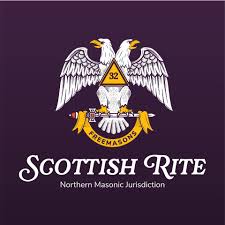What Masonic status is required?
Membership in good standing in a regular Symbolic Lodge is the only Masonic status required for the purpose of petitioning for the Scottish Rite.
Must I be invited to join Scottish Rite?
As a Master Mason in good standing, you are encouraged heartily to apply for membership in the Rite without awaiting a specific invitation. You may ask a Scottish Rite friend for a petition form or contact the nearest Scottish Rite Secretary for an application or further information.
What are the requirements of residence?
No subordinate body of the Rite may elect any candidate unless he is, at the time, an affiliated Master Mason in good standing and has resided in the state one year and in the local jurisdiction (valley area) for six months. Scottish Rite law, however, does provide for the possibility of waiving the usual residence requirements upon the presentation of valid reasons.
Can Scottish Rite membership be divided?
Primary Scottish Rite membership shall not be divided but shall be with the bodies of one Valley so far as opportunity exists.
Are there any regulations as to physical condition?
Physical impairment shall not be considered a disqualification from receiving the degrees of the Rite.
Oath of Fealty
Before receiving the degrees of the Scottish Rite, every candidate must sign the Oath of Fealty:
“I, the undersigned, do hereby promise on my word of honor, and swear true faith, allegiance, and fealty to the Supreme Council of Sovereign Grand Inspectors General of the Thirty-third and Last Degree of the Ancient Accepted Scottish Rite of Freemasonry for the Northern Masonic Jurisdiction of the United States of America, sitting at its Grand East in the Town of Lexington, Massachusetts, of which the Illustrious . . . is Sovereign Grand Commander, and will support and abide by its Constitutions, Orders, and Decrees.
“That I will hold allegiance to the said Supreme Council and be loyal thereto, as the supreme authority of the Rite; will hold illegal and spurious every other Body that may be established within its jurisdiction, claiming to be a Supreme Council, and every other Body of said Rite within the same Jurisdiction that does not hold its powers from said Supreme Council, and will hold no communication whatever in Scottish Rite Masonry with any member of the same nor allow him to visit any Body of the Rite of which I may be a member; and I will dispense justice to my brethren according to the laws of equity and honor.
“And should I violate this, my solemn vow and pledge, I consent to be expelled from Scottish Rite Masonry, and all rights therein and in any Body of the Rite, and to be denounced to every Body of the Ancient Accepted Scottish Rite in the world as a traitor and forsworn.
“And may God aid me to keep and perform the same. Amen.”
Declaration of Principles
Each petitioner must also hear the following Declaration of Principles:
“This Supreme Council reaffirms its unswerving loyalty to the fundamental purpose of Free masonry, which purpose from time immemorial has been to improve and strengthen the character of the individual man, and through the individual, the character of the community, thus undergirding the community with those spiritual values which give it strength and stability.
“This Supreme Council believes that this purpose is to be attained by laying a broad basis of principle upon which men of every race, country, sect, and opinion may unite.
“Believing that good and true men can be trusted to act well and wisely, this Supreme Council considers it the duty of the Fraternity to impress upon its members the principles of personal righteousness and personal responsibility, to enlighten them as to those things which make for human welfare, and to inspire them with that feeling of charity, or well-wishing, toward all mankind which will move them to translate principle and conviction into action.
“To that end Freemasonry teaches a belief in God and faith in His divine purposes. It encourages the worship of God in conformity with the dictates of individual conscience. It stands for truth and justice, liberty and enlightenment, fraternity and philanthropy.
“This Supreme Council expects of its members strict obedience to the laws of the land, and respect for their country’s flag.
“Such principles unite men and encourage the pursuit by them, individually and collectively, of worthy endeavors and the attainment of the purposes inherent in them. In that unity, human character achieves its highest unfolding and provides man’s best hope for peace on earth and goodwill among men.
“To the furtherance of these principles, all our ritual is directed and all our efforts are aimed. To their furtherance, each Master Mason has pledged himself and at the portal of the Scottish Rite has renewed that pledge.
“This Supreme Council discountenances and rejects any attempt by any international groups or confederations of Scottish Rite Supreme Councils to legislate for individual Supreme Councils.
“Recognizing that principles unite men, that programs sometimes divide them, and that the preservation of unity of purpose and devotion to principle is essential to Freemasonry, the Supreme Council affirms its continued adherence to that ancient and approved rule of Freemasonry which forbids the discussion within tyled doors of creeds, politics, or other topics apt to excite personal animosities.
“This Supreme Council further affirms its conviction that it is not only contrary to the fundamental principles of Freemasonry but exceedingly dangerous to its unity, strength, usefulness and welfare for Masonic Bodies in their official capacity to take formal action or attempt to exercise pressure or influence for or against any particular legislative project or proposal, or in any way to attempt to procure the election or appointment of Governmental officials, whether executive, legislative, or judicial, or to influence them, whether or not members of the Fraternity, in the performance of their official duties.”
What is the attitude of the Northern Jurisdiction with respect to religion?
Like the Symbolic Craft, Scottish Rite does not seek to intrude upon the prerogatives of the Church nor does it attempt to teach any creed. Scottish Rite is not a religion and does not pretend to be a substitute for religion. Its rituals do not hold out the hope of heavenly rewards.
The Rite does require that its adherents profess a monotheistic belief in Almighty God and encourages its members to become active participants in their respective churches. The Fraternity is a meeting place for Christians, Hebrews, Moslems, Parsees and any other believers in a monotheistic faith. As such, it has become the handmaiden of religion. To inject or discuss religious creeds could only be divisive.
Scottish Rite does seek to teach its members a system of morality and thereby develop in our brethren virtues and character which make men worth while.
What is the attitude of the Northern Jurisdiction with respect to politics?
The position of the Northern Jurisdiction has been fully set forth in a Declaration of Principles adopted in 1923 and reaffirmed in 1929, 1934, 1938 and 1969. The concluding paragraphs of this Declaration read:
“Recognizing that principles unite men, that programs sometimes divide them, and that the preservation of unity of purpose and devotion to principle is essential to Freemasonry, the Supreme Council affirms its continued adherence to that ancient and approved rule of Freemasonry which forbids the discussion within tyled doors of creeds, politics, or other topics apt to excite personal animosities.”
“This Supreme Council further affirms its conviction that it is not only contrary to the fundamental principles of Freemasonry, but exceedingly dangerous to its unity, strength, usefulness, and welfare for Masonic bodies in their official capacity to take formal action or attempt to exercise pressure or influence for or against any particular legislative project or proposal, or in any way to attempt to procure the election or appointment of governmental officials, whether executive, legislative, or judicial, or to influence them, whether or not members of the Fraternity, in the performance of their official duties.”
The leadership of the Northern Supreme Council stands squarely behind the foregoing statement and forbids the use of Scottish Rite publications or mailing lists for the circulation of messages of a political nature.
Is the character of petitioners investigated?
Each subordinate body has the right to inquire into the character and Masonic standing of each applicant through the use of investigating or membership committees.
Are candidates balloted upon?
No person shall receive the degrees of the Rite or be elected to membership by affiliation without the unanimous consent of the Brethren voting thereon.
What does it cost to take the Scottish Rite Degrees?
General speaking, the cost of securing the Fourth to Thirty-second Degrees, inclusive, ranges from $125.00 to $200.00. Fees are established for each body in a Valley. For instance, on a $150.00 basis, a Valley might charge $40.00 for Lodge of Perfection (4°-14°); $25.00 for Council, Princes of Jerusalem (15°-16°); $25.00 for Chapter of Rose Croix (17°-18°); and $60.00 for Consistory (19°-32°). Dues are nominal.
Minimum fees and dues have been established by the Supreme Council, but states and Valleys have the right to increase such fees and dues as needs indicate. Valley dues statements may include or add a Supreme Council Assessment of $2.00 annually.


